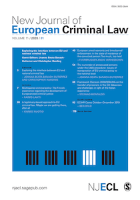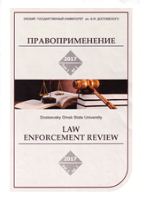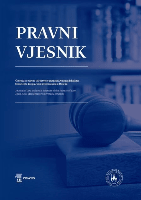
Revista General de Derecho Penal
Scope & Guideline
Navigating the complexities of penal legislation.
Introduction
Aims and Scopes
- Criminal Law Theory and Reform:
Explores foundational theories of criminal law, including deterrence, responsibility, and liability, alongside contemporary reforms and their implications. - Human Rights and Criminal Justice:
Examines the relationship between criminal law and fundamental rights, addressing issues such as victim rights, due process, and the implications of legal reforms on individual freedoms. - Cybercrime and Digital Law:
Focuses on the emerging challenges posed by technology in the realm of criminal law, including cybercrime, digital privacy, and the implications of artificial intelligence. - Comparative Criminal Law:
Analyzes different legal systems and their approaches to criminal law, offering insights into international norms and practices. - Environmental Criminal Law:
Investigates the intersection of criminal law with environmental protection, assessing the effectiveness and enforcement of laws aimed at environmental crime. - Social Issues and Criminal Law:
Addresses the impact of social issues, such as gender-based violence and human trafficking, on criminal law and policy, emphasizing the need for responsive legal frameworks.
Trending and Emerging
- Cybercrime and Digital Security:
Recent articles are increasingly addressing the implications of digital technology on criminal law, including issues of digital impersonation, online fraud, and the legal challenges posed by artificial intelligence. - Gender-Based Violence and Criminal Law:
There is a growing focus on gender issues in criminal law, particularly regarding domestic violence and sexual offenses, reflecting societal demands for legal reform and protection for vulnerable populations. - Transnational Crime and Globalization:
Emerging themes include the analysis of transnational crime, such as trafficking and organized crime, highlighting the need for international cooperation and legal frameworks. - Environmental Crimes and Legal Responses:
A notable increase in discourse surrounding environmental crimes indicates a shift towards recognizing the need for legal mechanisms to address ecological harm. - Victimology and Restorative Justice:
Emerging discussions on the rights of victims and the principles of restorative justice are gaining traction, suggesting a shift towards more victim-centered approaches in criminal law.
Declining or Waning
- Traditional Crime Categories:
There seems to be a reduced emphasis on conventional crime categories like theft and assault, as the journal increasingly focuses on complex issues such as cybercrime and global crime networks. - Historical Analysis of Criminal Law:
Fewer articles are dedicated solely to historical perspectives or reviews of past legal frameworks, indicating a shift towards current and future-oriented discussions. - Local Jurisdictional Issues:
There is a noticeable decline in articles focusing on local or national jurisdictional issues, as the journal broadens its scope to encompass international and comparative perspectives.
Similar Journals

New Journal of European Criminal Law
Empowering researchers and practitioners in criminal law.New Journal of European Criminal Law is a prominent academic journal devoted to the expansive realm of criminal law within the European context. Published by SAGE Publications Inc, this journal is dedicated to fostering scholarly dialogue and disseminating cutting-edge research that informs both policy and practice in the field. With an impressive Q3 ranking in Law and a solid position within the 60th percentile among its peers in Scopus, it serves as a vital resource for academics, practitioners, and students alike. Although the journal operates under a traditional access model, it provides readers with insightful articles that cover contemporary issues, legal analyses, and case studies pertinent to European criminal law. Since its inception in 2009, the journal has continually pursued its objective of advancing understanding and improving legal frameworks by inviting contributions that challenge existing paradigms and propose innovative solutions. Join a community committed to excellence in research and practice, and explore the latest developments in European criminal law within the pages of this esteemed journal.

Pravoprimenenie-Law Enforcement Review
Transforming challenges into solutions in law enforcement.Pravoprimenenie-Law Enforcement Review is an esteemed open-access journal dedicated to the critical examination of law enforcement practices and judicial applications. Published by Dostoevsky Omsk State University, this journal has been contributing to the legal field since its inception, with an open-access model initiated in 2017, ensuring widespread availability of knowledge and research. The journal focuses on a diverse range of topics, including legal theory, criminal justice, and law enforcement methodologies, making it a vital resource for researchers, practitioners, and students interested in law and public policy. With its commitment to advancing scholarship and fostering dialogue within the legal community, Pravoprimenenie serves as a pivotal platform for innovative thoughts and impactful research that addresses contemporary challenges in law enforcement.

UNIVERSITY OF CHICAGO LAW REVIEW
Illuminating the Path of Legal ScholarshipUniversity of Chicago Law Review is a prestigious academic journal dedicated to advancing legal scholarship, published by the University of Chicago Law School. Renowned for its rigorous peer-review process and high editorial standards, this journal is recognized as a leader in the field of law, achieving a Q1 ranking in the 2023 category of Law and occupying a notable position within the Scopus rankings, specifically at #199 out of 1025 in the Social Sciences - Law category, placing it in the 80th percentile. The journal provides an essential platform for legal scholars, practitioners, and students to engage with cutting-edge research and theory across various legal disciplines, including constitutional law, criminal law, and comparative law. With a commitment to fostering critical discourse, the University of Chicago Law Review has been instrumental in shaping legal thought, making it a vital resource for anyone seeking to contribute to or understand the evolving landscape of legal studies. Although it does not currently offer open access, subscription options provide robust access to its extensive archive of scholarly articles since its inception.

University of Western Australia Law Review
Navigating the Complexities of Legal ThoughtThe University of Western Australia Law Review is a prestigious academic journal dedicated to the critical examination and exploration of legal issues in Australia and beyond. Published by the Law School of the University of Western Australia, this journal has become a significant resource for legal scholars, practitioners, and students alike, contributing to the rich discourse in the field of law. With an ISSN of 0042-0328 and a current categorization in the Q3 quartile in the field of Law as per the 2023 rankings, it stands among a cohort of respected legal publications. The journal, though not open access, facilitates a sharing of unique insights and research from 2019 to 2024, aiming to address emerging and traditional legal challenges within a global context. With a Scopus rank of #651 out of 1025 in Social Sciences Law, it holds a percentile of 36, reflecting its valuable contributions to legal scholarship. The University of Western Australia Law Review invites researchers, practitioners, and students to engage with its rich content and to contribute to the ongoing dialogue shaping the future of law.

Revista Brasileira de Direito Processual Penal
Bridging Theory and Practice in Procedural LawRevista Brasileira de Direito Processual Penal, published by the Instituto Brasileiro de Direito Processual Penal (IBRASPP), serves as a vital open-access platform for scholars and practitioners in the fields of criminal procedure law and social sciences. With an ISSN of 2359-3881 and an E-ISSN of 2525-510X, the journal has been committed to disseminating innovative legal research since its opening access in 2015, thus fostering engagement within legal academia. Based in Brazil and reaching an array of international contributors, it has achieved a respectable Q2 ranking in both Anthropology and Law categories as of 2023, appealing to a diverse audience interested in legal studies, sociology, and the interplay with mental health issues. The journal's ongoing commitment to excellence and impactful scholarship is reflected in its competitive standing across multiple Scopus ranks, making it a significant resource for researchers, legal professionals, and students looking to deepen their understanding of procedural law and its implications in contemporary society.

Champ Penal-Penal Field
Contributing to a deeper understanding of legal impacts.Champ Penal-Penal Field is a premier academic journal dedicated to the interdisciplinary discourse surrounding penal law and its implications in modern society. Published by the Associé Champ Penal-Penal Field, this journal, with ISSN 1777-5272, aims to bridge theoretical and practical aspects of penal studies, fostering a deeper understanding of legal frameworks and their societal impacts. Although it operates under a traditional access model, the journal is committed to providing high-quality research that contributes to the legal field and informs both practitioners and policymakers. Its editorial board comprises esteemed experts who advocate for rigorous analysis and innovative perspectives. The journal plays a vital role in advancing knowledge and dialogue, making it an invaluable resource for researchers, professionals, and students engaged in the complex landscape of penal law.

Pravni Vjesnik
Connecting Ideas, Shaping Legal Futures.Pravni Vjesnik is a peer-reviewed academic journal published by the Pravni Fakultet Sveučilišta Josipa Jurja Strossmayera & Osijek, primarily focusing on the field of law within the social sciences. Since transitioning to an Open Access model in 2016, the journal has broadened its accessibility, allowing researchers, professionals, and students to engage with diverse legal scholarship without subscription barriers. With an ISSN of 0352-5317 and an E-ISSN of 1849-0840, Pravni Vjesnik plays a crucial role in disseminating knowledge and fostering discourse in the legal community, particularly within the context of the Croatian legal system and broader European legal frameworks. Although it holds a rank of #760 out of 1025 in the Scopus database, placing it in the 25th percentile of law journals, its commitment to quality and relevance ensures its importance as a resource for rigorous academic inquiry. The journal's scope is anticipated to expand from 2019 to 2024, promoting ongoing research in contemporary legal issues. This dedication to publishing comprehensive and impactful studies makes Pravni Vjesnik an essential platform for those involved in the legal field.

International Journal of Criminal Justice Sciences
Unlocking insights in criminal justice sciences.The International Journal of Criminal Justice Sciences is a premier academic publication dedicated to advancing the field of criminal justice through rigorous research and innovative scholarship. Published by MANONMANIAM SUNDARANAR UNIVERSITY in India, this Open Access journal has been a vital platform for researchers since 2006, promoting unrestricted access to critical knowledge and insights in the realm of law and criminal justice. With a commendable Scopus ranking of #379 out of 1025 in the Social Sciences - Law category, placing it in the 63rd percentile, it holds an essential position for those engaged in legal studies. The journal is particularly beneficial for academics, practitioners, and students aiming to explore contemporary issues, innovative practices, and theoretical advancements in the discipline. Its commitment to quality research is reflected in its Q3 Quartile designation and the continuous convergence of research contributions anticipated from 2017 to 2024. Whether you are looking to publish your findings or seek valuable insights from peer-reviewed articles, the International Journal of Criminal Justice Sciences remains an indispensable resource for fostering knowledge and dialogue in this critical field.

Vestnik of Saint Petersburg University-Law-Vestnik Sankt-Peterburgskogo Universiteta-Pravo
Pioneering Research in the Heart of Russian LawVestnik of Saint Petersburg University-Law, published by St Petersburg University Press, is a vital academic resource in the field of law, particularly significant within the Russian legal landscape. With an ISSN of 2074-1243 and an E-ISSN of 2587-5833, this journal serves as a platform for rigorous research, critical analysis, and scholarly discourse, contributing to the advancement of legal knowledge and practice. Although currently classified in the Q4 quartile for the year 2023 by Scopus rankings, it holds a unique position within the academic community, catering to a diverse audience of researchers, legal professionals, and students, especially those interested in the evolving nuances of law in Russia. You can explore comprehensive studies and articles that reflect the contemporary challenges and developments in law, while benefiting from the journal's focus on fostering a deep understanding of legal principles. The journal runs from 2019 to 2024, encapsulating emerging trends and insights in law that are critical for continuous learning and growth in this discipline.

Revista de Derecho Privado
Exploring the nuances of Latin American legal principles.Revista de Derecho Privado, published by UNIV EXTERNADO COLOMBIA, stands as a vital contribution to the field of law, specifically focusing on private law issues in a Colombian and broader Latin American context. Since its inception in 2005 as an open-access journal, it has been dedicated to the dissemination of scholarly articles that enrich the understanding of legal principles, practices, and reforms, making it an essential resource for researchers, practitioners, and students alike. The journal currently holds a Q2 ranking in the 2023 Scopus category of Law, reflecting its position among the top-tier publications in the field and its commitment to quality scholarship, as evidenced by its ranking of #645 out of 1025 journals. With an open-access model, the content is freely available to a global audience, thereby expanding its reach and impact. The journal continues to thrive, with converged years spanning from 2015 to 2024, ensuring its relevance to ongoing legal discourse and education in a rapidly evolving legal landscape.